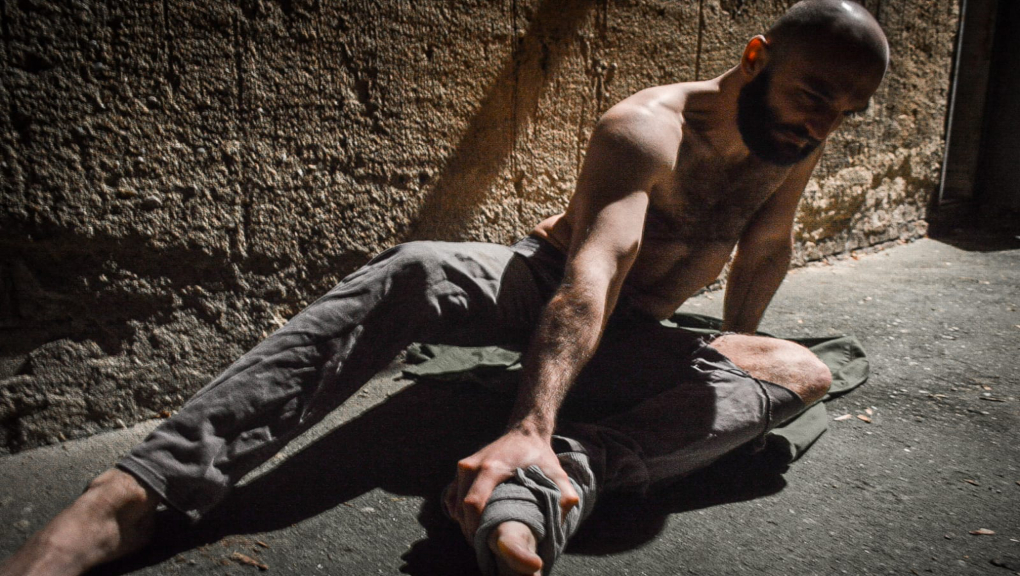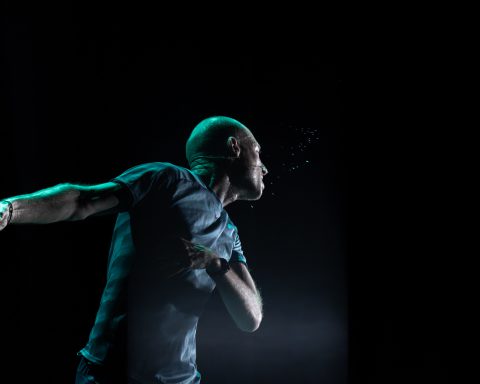Philoctetes, written by Sophocles, tells the story of a mythical Greek hero who suffered bitter misfortune during the Trojan war. Sworn to protect Helen, queen of Sparta, he sets out for Troy with Odysseus and the Atreidae. Philoctetes is bitten by a snake on the island of Lemnos, causing a festering, incurable wound. Subsequently his compatriots, loathe to endure his suffering, leave him behind on the inhospitable island and sail for Troy. Later, during battle, they capture Helenus, a seer. He foretells that only Philoctetes, with the legendary bow of Heracles, can win the battle for Troy.

Ten years after leaving Philoctetes to his suffering, Odysseus again sails for Lemnos.
Neoptolemus, son of the much-beloved hero Achilles, travels with him. Their mission is to return to Troy with Philoctetes and his bow. Once there, Odysseus persuades the reluctant, honourable young Neoptolemus to deceive Philoctetes. He has to lie to convince the ill-fated man to sail with them to Troy. Odysseus urges Neoptolemus to pretend that he also has reason to hate Odysseus and the Greeks. He is to invent a story that Odysseus stole his father’s armor, his birthright.
The principled young man is troubled by the deceit.
However, Neoptolemus thus meets and befriends Philoctetes while Odysseus hides on the ship. Neoptolemus listens to Philoctetes’ tale of woe, and witnesses his terrible suffering first-hand. He again doubts the deception. Philoctetes begs Neoptolemus to grant him safe passage home. Securing his promise, they prepare to set off. However, Philoctetes suffers a sudden spasm of intense pain, and hands the bow to Neoptolemus.
Just then, Odysseus arrives. The deception is revealed and Philoctetes raves against the betrayal and anew against Odysseus. He laments his ill luck and declares his intention to end his life. Odysseus, after a dramatic scene, again leaves. Neoptolemus gives Philoctetes his bow back and promises to take him home. As they are setting sail, Heracles, now immortal, appears. If Philoctetes sails to Troy, he says, he will be healed and be victorious in battle; returning home a hero.

Morality has been a poignant theme throughout human history.
Often, of late, I found myself in conversation about the nature of morality and its central role in our lives. A recent Philosophy exam brought the topic to the fore in my mind and sparked more in-depth contemplation. What are the origins of morality, of compassion, in humans? Some say it is genetic, others that it is principally socially learnt behavior. Can one be genetically predisposed to being more or less empathic?
We learn much about ourselves in potentially disastrous situations.
Watching Covid19 spread across the world, affecting millions of people, what do we feel most? Do we feel empathy for those affected, or relief that we are – at least for now – safe and healthy? Few of us will ever be faced with the kind of life-threatening situations depicted in action movies. It’s unlikely that we will ever have to choose the life of many over the life of one. However, we make moral decisions and moral considerations on a daily basis. We choose, regularly and often subconsciously, how we will act, what to admit or omit. Looking the other way or facing the consequences of standing up for ourselves and others.
We choose the small lie, the half-truth, the easy way out. Or we choose the side of empathy, compassion, of doing the right thing.
Neoptolemus, however, ultimately makes the right decision. He chooses the side of principle, of empathy, of honor. So turning back, he returns Philoctetes’ bow, and offers him passage home. He reaches out a hand in friendship to save the wretched man. Against the direct orders of Odysseus, he gives in to his sense of humanity. Did he inherit this sense of honor and justice from his upstanding father, the hero Achilles? Did growing up with such a father shape his young mind and instill in him the same values?
In the end we each decide whether to act purely out of self-interest, or for the greater good.
What does that make of Odysseus? Do we dismiss him as arrogant, bombastic, and heartless? As unprincipled, immoral, and unsympathetic? After all, he was renowned for being a trickster: cunning, and often cruel. In many myths he shows remarkable passion in the pursuit of his goals. He therefore goes to great lengths to achieve what he sets out to do.

In Philoctetes, we have a great battle between justice and power. Foremost, in the mind of young Neoptolemus, who must decide on which side he stands.
ETL, in association with Neues Schauspiel Leipzig, presents Philoctetes, directed by Abigail Akavia and with original musical score by Matthew Hendershot. Tickets are available online or by telephone at: 0341 927 997 70.
Dates: 5th, 6th, 7th, 20th and 21st of March 2020
Time: 20:00
Place: The Neues Schauspiel Leipzig, Lützner Str. 29, 04177 Leipzig
Tickets: 13€, reduced price 9€








![Wine & Paint event on 9 Nov. 2024 at Felix Restaurant, Leipzig. Photo: Florian Reime (@reime.visuals] / Wine & Paint Leipzig](https://leipglo.com/wp-content/uploads/2024/12/pixelcut-export-e1733056018933-480x384.jpeg)


